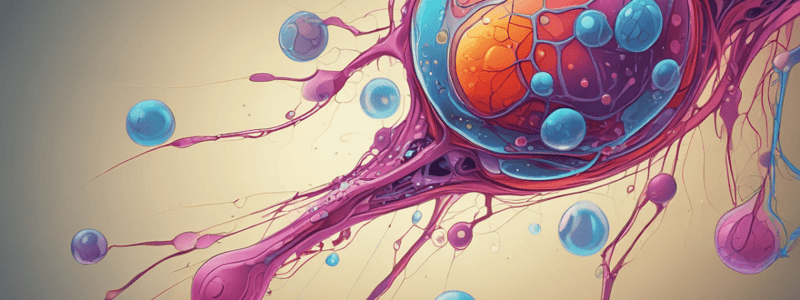Podcast
Questions and Answers
What are the three key characteristics that define stem cells?
What are the three key characteristics that define stem cells?
Undifferentiated, ability to give rise to specialized cells, and ability to divide to produce more stem cells
What is the term used to describe the ability of stem cells to differentiate into more specialized cell types?
What is the term used to describe the ability of stem cells to differentiate into more specialized cell types?
Potency
What are the three types of stem cells, and how do they differ in terms of potency?
What are the three types of stem cells, and how do they differ in terms of potency?
Totipotent, pluripotent, and multipotent cells, with totipotent cells being the most potent and multipotent cells being the least potent
What is the primary source of embryonic stem cells, and how are they obtained?
What is the primary source of embryonic stem cells, and how are they obtained?
What is the primary source of adult stem cells, and how are they obtained?
What is the primary source of adult stem cells, and how are they obtained?
What is the primary use of stem cells in medicine, and what diseases can they be used to treat?
What is the primary use of stem cells in medicine, and what diseases can they be used to treat?
What are the two potencies that embryonic stem cells can exhibit, and what is the difference between them?
What are the two potencies that embryonic stem cells can exhibit, and what is the difference between them?
What are the benefits of using stem cells in medicine, and what are the risks associated with their use?
What are the benefits of using stem cells in medicine, and what are the risks associated with their use?
What are the ethical issues associated with the use of embryonic stem cells, and how do they differ from adult stem cells?
What are the ethical issues associated with the use of embryonic stem cells, and how do they differ from adult stem cells?
What is the importance of educating the public about stem cells, and what are the social implications of their use?
What is the importance of educating the public about stem cells, and what are the social implications of their use?
At what stage of its development should an embryo be regarded as, and treated as, a person?
At what stage of its development should an embryo be regarded as, and treated as, a person?
What is the Hayflick limit, and why is it relevant to stem cell research?
What is the Hayflick limit, and why is it relevant to stem cell research?
What are the reasons for regulating authorities in human embryo research?
What are the reasons for regulating authorities in human embryo research?
What are the advantages of using stem cells from the patient instead of a donor?
What are the advantages of using stem cells from the patient instead of a donor?
Why is embryonic stem cell therapy the most controversial?
Why is embryonic stem cell therapy the most controversial?
How do stem cells decrease with age?
How do stem cells decrease with age?
How can stem cells from a healthy donor provide treatment for a disorder?
How can stem cells from a healthy donor provide treatment for a disorder?
What is the significance of the 'ource of stem cell' in research?
What is the significance of the 'ource of stem cell' in research?
Why is it essential to regulate the age of embryos used in research?
Why is it essential to regulate the age of embryos used in research?
What is the benefit of using autologous stem cells in therapy?
What is the benefit of using autologous stem cells in therapy?
Flashcards are hidden until you start studying




